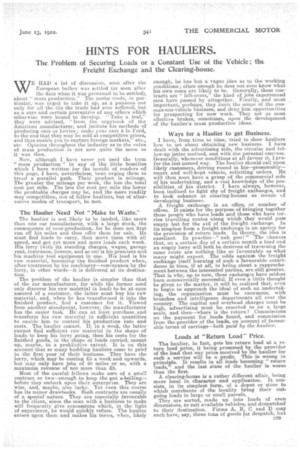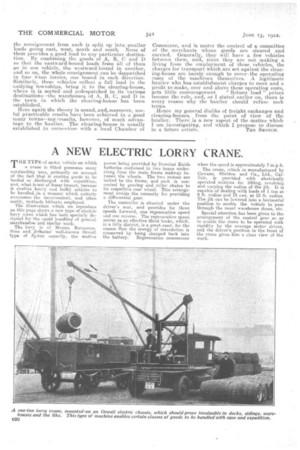HINTS FOR HAULIERS.
Page 27

Page 28

If you've noticed an error in this article please click here to report it so we can fix it.
The Problem of Securing Loads or a Constant Use of the Vehicle ; the Freight Exchange and the Clearing-house.
WE HAD a lot of discussion, soon after the European bother was settled (or soon after the date when it was presumed to be settled), about " mass production." The motor trade, in particular, was urged to take it up., as a panacea not only for all the ills, the trade had ever suffered, but as a sure and certain preventive of any others which otherwise were bound, to develop. " ".Cake a leaf," they were advised, "from -the copybook of the American manufacturer, and imitate his methods of producing cars or lorries ; make your cars h is Ford, to the end that they may be sold at competitive prices, and tills enable you to capture foreign markets," etc., etc. Opinion throughout the industry as to the value of mass production is not now quite the same as it was then.
Now, although I have never yet used the term 'mass production" in any of the little homilies which I have written for the benefit of readers ..of this page, I have, nevertheless, been urging them to tread a parallel path. Their product is mileage. The greater the mileage per week, the less the total. cost per mile. The less the cost per mile the lower the profitable charges may be, and the more readily may competition, not of fellow hauliers, but of alternative modes of transport, be met.
The Haulier Need Not "Make to Waste."
The haulier is not likely to be landed, like more than one car manufacturer, with a large stock, the consequence of over-production, for he does not firs.t run off his miles and then offer them for sale. He must find loads to carry, then move them, with all speed, and get yet more and more loads each week. His lorry (with its standing charges, . wages, garage rent, insurance, licence, and so on) is his premises and. his machine tool equipment in one. His load is his 'raw material, becoming the finished product when, after treatment by his machinery—conveyance by the lorry, in other words—it is delivered at its destination.
The problem of the haulier is simpler than that of the car manufacturer, for while the former need only discover his raw material (a load) to be at once assured of a customer, the latter must buy his raw material, 'and, when he has transformed it into the finished product, find a customer for it. Viewed from another standpoint, however, the manufacturer has the easier .task. He can at least purchaseeand transform his raw material in sufficient quantities to enable him to control his production rate and costs. The haulier cannot. If, in a week, the latter cannot find sufficient raw material in the shape of loads • to keep his lorry going, then his costs for the finished goods, in the shape of loads carried, mount up, maybe, to a prohibitive extent. It is on this account that so many budding hauliers come to grief in the first year of their business. They have the lorry, which may be costing 1.5 a week and upwards, but may only have jobs of 50 miles or so, with a maximum revenue of not more than ka.
Most of the careful fellows make sure of a small contract or two—enough to keep the pot a-boiling-before they embark upon their enterprise. They are wise, and, maybe, also lucky. Yet even this course has its minor drawbacks. Such contracts are usually of a special nature. They are especially favourable to the client, since the man with a business to make will frequently give concessions which, in the light of experience, he would quickly refuse. The haulier enters upon them and makes his terms, when, likely enough, he has but a vague idea as to the working conditions; often enough he does not even know what his own coats are likely to be. Generally, these contracts are "left-overs," the kind of jobs experienced men have passed by altogether. Finally, and most important, perhaps, they limit the scope of the oneman-one-vehicle business, and deny him opportunities for prospecting for new work. They act as most effeetive brakes, sometimes, upon the development of the haulier's mass production ideas.
Ways for a Haulier to get Business.
I have, from time to time, tried to show hauliers how to set about obtaining new business. I have dealt with the advertising side, the circular and follow-up letter method, and with the personal canvass. Generally, whenever conditions at all favour it, I prefer the last named way. The haulier should call upon likely customers, driving round in his—presumablysmart and well-kept vehicle, soliciting orders. He will then soon have a grasp of the commercial side of his undertaking, and a real knowledge of the possibilities of his district. I have always, however, been. inclined to fight shy of freight exchanges, and to look askance at clearing-houses as means of developing business. A freight exchange is an office, or number of offices. It exists for the purpose of bringing together those people who have loads and those who have lorries travelling routes along which they would pass empty but for the aid of the freight exchange. In its simplest form a freight exchange is an agency for the provision of return loads. In theory, the idea is excellent. In practice—" nah pool" The chances that, on a certain day of a certain month a load and an empty lorry will both be desirous of traversing the same route are nothing like so favourable as what many might expect. The odds against the freight exchange itself learning of such a favourable coincidence in time, if at all, to bring about a rapprochement between the interested parties, are still greater. That is why, up to now, these exchanges have seldom been commercially successful. If even a little thought be given to the matter, it will be realized that, even to begin to approach the ideal of such an undertaking, the organization must be enormous, with branches and intelligence departments all over the country. The capital and overhead charges must be high, advertising must be resorted to on a large scale, and then—where is the return ? Commissions on the payment for loads found, and commission from the provider of the loads, on account of favourable terms of carriage—both paid by the haulier.
Loads at "Return Load" Price.
The haulier, in fact, gets his return load at a return load price, it being presumed by the provider of the load that any price received by the haulier for such a service will be a profit. This is wrong in principle. It reaults in all loads becoming, " return loads,' and the last state of the haulier is worse than the first.
A clearing-house is a rather different affair, being more local in character and application. It consists, in its simplest form, of a depot or store to which merchants of the locality bring their outgoing loads in large or small parcels. They are sorted, made up into loads of even dimensions, to suit available vehicles, and despatched to their destination. Firms A, B, C and D may each have, say, three torts of goods for despatch, but
the consignment from each is split up into smaller loads going east, west, north and south. None of them provides a good load to any particular destination. By combining the goods of A, B, C and 1) so that the eastward-bound loads from all of them go in one vehicle, the westward-bound in another, and so on, the whole consignment can be despatched in four 3-ton lorries, one hound in each direction. Similarly, these vehicles collect a full load in the outlyin)T townships, bring it to the clearing-house, where it is sortedand redespatched to its various destinations—the warehouses of A, B, C, and D in the town in which the clearing-house has been established.
Here again the theory is sound, and, moreover, useful practicable results have been achieved in a good many towns—not ;results, .however, of much advantage to the haulier. The clearing-house is usually established in connection with a local Chamber of
Commerce, and is under the control of a committee of the Merchants whose goods are cleared and carried. Generally, they will have a few vehicles between them, and, since they are not making a living from the employment of these vehicles, the charges for transport which are set against the clearing-house are barelyenough to cover the operating costs of the machines themselves. A legitimate haulier who has establishment charges to meet and a profit to make, over and above these operating costs,
gets little encouragement, Return =load ' prices become the rule, and, as I stated earlier on, there is every reason why the haulier should refuse such terms, Hence my general dislike of freight exchanges and clearing-houses, from the point of view of the haulier. There is a new aspect of the matter Which I am investigating, and which I propose to discuss
in a future article. THE SKOTCH.


































